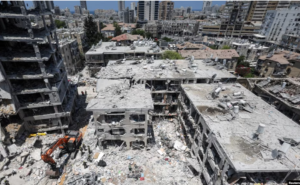
Growing domestic demand combined with huge oil reserves will lead to a significant increase in refining capacity in the Middle East, according to industry publication Offshore Technology, citing a study by GlobalData Energy.
“The Middle East is expected to be a key region in terms of growth in traditional refinery capacity worldwide, accounting for more than a quarter of the total increase by 2030. This growth is driven by large-scale projects, particularly in Iran and Iraq. Both countries are using their vast oil reserves to expand their oil refining infrastructure in an effort to meet growing domestic demand, reduce oil product imports, and strengthen their export capabilities,” the experts write.
In their opinion, Iran will dominate in terms of refinery commissioning, accounting for 40% of the total. The country plans to commission a total of 15 new and expanded projects. The largest of these is Jask II, with a declared capacity of 6,000 barrels per day. The project is currently in the preliminary design stage and is expected to be launched in 2028.
Oil refining capacity in Iraq is expected to increase by 1.9 million bpd. New projects are leading the way in terms of commissioning rates in the country, accounting for 65% of the total expected volume by 2030. About 28% of these are under construction. One of the significant projects, Basra II, involves increasing production by 300 bpd in 2027.
Oman ranks third in terms of oil refining capacity growth, with an increase of 695,000 bpd by 2030.

Amir Saeed Iravani, Iran’s permanent representative to the United Nations, has published a letter condemning President Trump’s airstrikes on three key nuclear sites in the Islamic Republic of Iran, Fox News reports.
“The Islamic Republic of Iran condemns in the strongest terms these unprovoked and deliberate acts of aggression. Undoubtedly, the United States’ military aggression against sovereignty and territorial integrity is a clear and flagrant violation of international law and the imperative international norms enshrined in the Charter of the United Nations,” Eraj Saeed wrote, after which he called on the UN Security Council to immediately convene an emergency meeting due to the “savage and barbaric” actions of the US administration. enshrined in the Charter of the United Nations,“ Iravani wrote, calling on the UN Security Council to immediately convene an emergency meeting over the ”savage and criminal actions“ of the US.
”The Islamic Republic of Iran urges the Security Council to immediately convene an emergency meeting to consider this flagrant and illegal act of aggression, condemn it in the strongest terms and take all necessary measures within its responsibilities under the Charter to ensure that those responsible for such heinous crimes are held fully accountable and do not go unpunished,” Iravani wrote.

Oil prices accelerated their rise on Thursday afternoon as investors continued to monitor the Iran-Israel conflict, fearing supply disruptions if it escalates further.
The price of August Brent futures on the London ICE Futures exchange rose by $0.63 (0.82%) to $77.33 per barrel as of 13:53 GMT.
WTI oil contracts for July on the New York Mercantile Exchange (NYMEX) rose by $1.07 (1.42%) to $76.21 per barrel.
The situation in the Middle East remains in the spotlight. Investors are most concerned about the threat of restrictions on shipping in the Strait of Hormuz, which could lead to significant disruptions in oil supplies. The lack of clarity regarding US plans for involvement in the Iranian-Israeli conflict is negatively affecting market sentiment.
US President Donald Trump said on Wednesday that he had not yet made a final decision on how to resolve the Iranian issue. He reiterated that he did not rule out resuming talks with Tehran. At the same time, Trump noted that the outcome should be guarantees that Tehran will not have nuclear weapons.
The unpredictability that characterizes Trump’s foreign policy “is causing nervousness in a market that is looking for clearer signals that could affect global oil supplies and regional stability,” said Priyanka Sachdeva, an analyst at brokerage firm Phillip Nova.
RBC Capital Markets analyst Helima Croft believes that the threat of serious supply disruptions will increase if Iran feels a real threat to its existence. In her opinion, US involvement in the conflict could provoke direct attacks on tankers and energy infrastructure.
Meanwhile, according to data published yesterday by the US Department of Energy, commercial oil reserves in the country fell by 11.473 million barrels last week, marking a record drop since June last year. Experts had expected a decline of 2.3 million barrels, according to Trading Economics.
Gasoline inventories increased by 209,000 barrels, distillates by 514,000 barrels. Inventories at the Cushing terminal, where oil traded on the New York Mercantile Exchange (NYMEX) is stored, fell by 995,000 barrels.

Market under geopolitical pressure
This week, the cryptocurrency market experienced serious turbulence due to the escalation of the conflict in the Middle East. Following reports of Israeli strikes on Iranian targets, the price of Bitcoin fell below $103,000, and the total market capitalization of the cryptocurrency market declined by more than $140 billion. Later, BTC partially regained its positions, settling in the $105,000–107,000 range.
Ethereum also lost about 5%, dropping to $2,510.
Alternative tokens (Solana, Cardano) fell by 2–3%, while XRP unexpectedly rose by 2–2.4%.
The fear and greed index remains in the “Greed” zone (~60), but amid instability, it could quickly shift to the “Fear” zone.
How is the war between Israel and Iran affecting the crypto market?
Short-term and long-term forecasts
June forecast:
3–6 month forecast:
Long term:

According to preliminary information from the Ukrainian Embassy in Israel, on June 14, as a result of a massive missile attack by Iran against Israel and a missile hitting a residential building in Bat Yam, five Ukrainian citizens were killed, including three minors, the Ukrainian Foreign Ministry reported.
According to the ministry, the identities of the victims are currently being established.
Ukrainian diplomats and consuls are in close contact with the Israeli police and other services to identify and organize the repatriation of the bodies of the victims.

Comparative analysis of the economies of Israel and Iran
| Indicator | Iran | Israel |
| GDP | ~$400 billion | ~$540 billion |
| GDP per capita | ~$4 400 | ~$54 200 |
| Public debt/GDP | ~18 % | ~67 % |
| Military expenditures | 2.5% of GDP ($10 billion) | 5% of GDP ($27 billion) |
| Currency/gold reserves | ~$7.7 billion | ~$76 billion |
| Innovation indicators | ~1 patent/million people | ~74 patents/million people, developed hi-tech |